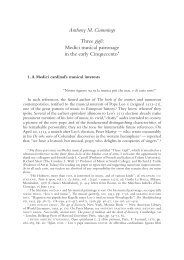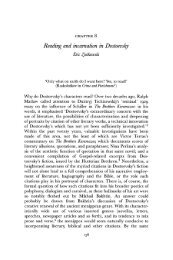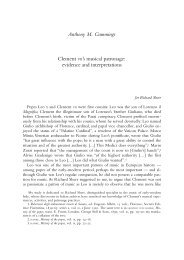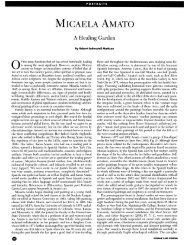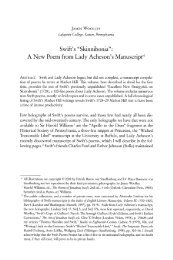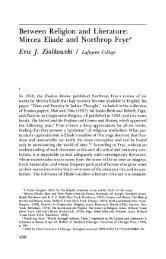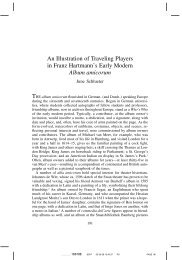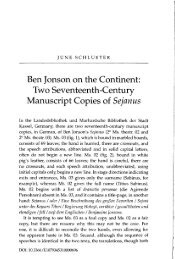courses of instruction - Lafayette College
courses of instruction - Lafayette College
courses of instruction - Lafayette College
Create successful ePaper yourself
Turn your PDF publications into a flip-book with our unique Google optimized e-Paper software.
ledge <strong>of</strong> European languages. Recitation.<br />
Mr. Marblestone<br />
111, 112. Intermediate Latin. Fall: Reading<br />
<strong>of</strong> short selections in prose and in the poetry<br />
<strong>of</strong> Catullus with attention to the political,<br />
moral, and cultural climate <strong>of</strong> the late Ro<br />
man Republic. Spring: Reading <strong>of</strong> at least<br />
one book <strong>of</strong> Tusculan Disputations <strong>of</strong> Cicero<br />
and <strong>of</strong> selections from the Satyricon <strong>of</strong> Petro-<br />
nius against the background <strong>of</strong> the early<br />
Roman Empire. Recitation. Mr. Marblestone<br />
211. Advanced Latin. Courses such as:<br />
Latin Lyric Poetry, Latin Elegy, Latin Prose<br />
<strong>of</strong> the Early Empire, Latin Satire, Medieval<br />
Latin, Latin Philosophy, Lucretius, and<br />
Cicero. Mr. Marblestone<br />
COMPARATIVE LITERATURE<br />
101,102. Survey <strong>of</strong> European Literature.<br />
Study <strong>of</strong> the most significant figures and<br />
their works in European literary history,<br />
exclusive <strong>of</strong> English. The course aims to<br />
acquaint students with the classics in the<br />
literatures <strong>of</strong> Greece, Rome, Italy, Spain,<br />
France, Germany, and Russia in English<br />
translation. No knowledge <strong>of</strong> foreign lan<br />
guages required. Open to all students.<br />
Lecture. Mr. Pribic<br />
225. Special Topics in Comparative Liter<br />
ature. This course introduces the method<br />
ology <strong>of</strong> comparative literature and the<br />
problems <strong>of</strong> translation to advanced litera<br />
ture students. Students should have com<br />
pleted at least two <strong>courses</strong> in literature<br />
given by Foreign Languages and Litera<br />
tures or the English department. A read<br />
ing knowledge <strong>of</strong> one foreign language is<br />
strongly recommended. Offered as need<br />
ed. S taff<br />
460. Reading and Research in Compara<br />
tive Literature. This course is designed to<br />
give advanced students the opportunity to<br />
investigate intensively an area <strong>of</strong> special<br />
interest. Students are required to meet<br />
with the instructor periodically through<br />
out the semester and to submit a scholarly<br />
paper, as well as to take an oral examina<br />
FOREIGN LANGUAGES AND LITERATURES<br />
tion at the conclusion <strong>of</strong> the course. Prereq<br />
uisite: Two literature <strong>courses</strong> in Foreign<br />
Languages and Literatures or English. Staff<br />
LITERATURE IN TRANSLATION<br />
The minor in Literature in Translation will<br />
normally consist <strong>of</strong> Comparative Litera<br />
ture 101,102; one course in classical litera<br />
ture (Comparative Literature 103,121, or<br />
125); two <strong>courses</strong> chosen from among<br />
Comparative Literature 131,141,152,161,<br />
162, or English 345; and Comparative Lit<br />
erature 225.<br />
103. Classical Mythology. Definitions,<br />
sources, and interpretations <strong>of</strong> myth as a<br />
cognitive system in ancient and modern<br />
culture. Survey <strong>of</strong> major divinities, mortals,<br />
myths, hero-legends, and cycles <strong>of</strong> saga,<br />
chiefly Greek. Their function in Greco-Ro<br />
man civilization, their enduring power in<br />
Western culture, and their influence upon<br />
Western intellectual and artistic achieve<br />
ment. Open to all students. Lecture/discus<br />
sion. [W] Mr. Marblestone<br />
121. Greek Literature in English. A study<br />
<strong>of</strong> the Greek perfection <strong>of</strong> diverse genres <strong>of</strong><br />
literature through close reading (usually<br />
<strong>of</strong> entire works) in Epic, Lyric, Tragedy,<br />
Old Comedy, History, Philosophical Dia<br />
logue. Relationship <strong>of</strong> literature to histori<br />
cal and cultural forces, particularly in the<br />
fifth-century polis <strong>of</strong> Athens. The notion <strong>of</strong><br />
a "classic" in literature. Open to all stu<br />
dents. Lecture/discussion. Mr. Marblestone<br />
125. Latin Literature in English. Close<br />
reading (usually <strong>of</strong> entire works) in major<br />
genres <strong>of</strong> Golden and Silver Age Latin litera<br />
ture including: Comedy, Epic, History, Ora<br />
tory, Lyric-Elegaic, Satire, the Proto-Novel,<br />
and the Roman renditions <strong>of</strong> Epicureanism<br />
and Stoicism. The Greek legacy <strong>of</strong> genre and<br />
form. Roman originality, particularly in<br />
Comedy and Satire. Relationship <strong>of</strong> litera<br />
ture to growth and expansion <strong>of</strong> the Roman<br />
Republic and Empire. Open to all students.<br />
Lecture/discussion. Mr. Marblestone<br />
142. Masterworks <strong>of</strong> German Literature<br />
and Film. In this course, important<br />
111




